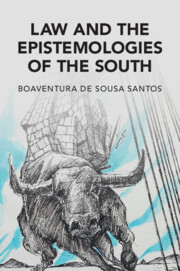Book contents
- Law and the Epistemologies of the South
- CAMBRIDGE STUDIES IN LAW AND SOCIETY
- Law and the Epistemologies of the South
- Copyright page
- Contents
- Preface
- Abbreviations
- Part One The Tragic Optimism of the Law: THE END OF A STORY
- Part Two Epistemologies of the South and the Law
- Part Three The Abyssal Law under the Mode of Abyssal Exclusion
- Part Four Real Legal Utopias: Interrupting the State
- Part Five Real Legal Utopias: Interrupting the Law
- Fourteen Law and Revolution in Portugal: Experiences of Popular Justice after the Carnation Revolution of 1974
- Fifteen Popular Justice in Cape Verde
- Sixteen The Landless Rural Workers’ Movement in Brazil and Its Struggles for Access to Law and Justice
- Seventeen The Law of the Excluded: Indigenous Justice and Plurinationality in Bolivia and Ecuador
- Eighteen Decolonising Justice and Democratic Peace in Colombia
- Part Six Real Legal Utopias: Interrupting Hegemonic Human Rights
- References
- Index
- Cambridge Studies in Law and Society
Seventeen - The Law of the Excluded: Indigenous Justice and Plurinationality in Bolivia and Ecuador
from Part Five - Real Legal Utopias: Interrupting the Law
Published online by Cambridge University Press: 07 August 2023
- Law and the Epistemologies of the South
- CAMBRIDGE STUDIES IN LAW AND SOCIETY
- Law and the Epistemologies of the South
- Copyright page
- Contents
- Preface
- Abbreviations
- Part One The Tragic Optimism of the Law: THE END OF A STORY
- Part Two Epistemologies of the South and the Law
- Part Three The Abyssal Law under the Mode of Abyssal Exclusion
- Part Four Real Legal Utopias: Interrupting the State
- Part Five Real Legal Utopias: Interrupting the Law
- Fourteen Law and Revolution in Portugal: Experiences of Popular Justice after the Carnation Revolution of 1974
- Fifteen Popular Justice in Cape Verde
- Sixteen The Landless Rural Workers’ Movement in Brazil and Its Struggles for Access to Law and Justice
- Seventeen The Law of the Excluded: Indigenous Justice and Plurinationality in Bolivia and Ecuador
- Eighteen Decolonising Justice and Democratic Peace in Colombia
- Part Six Real Legal Utopias: Interrupting Hegemonic Human Rights
- References
- Index
- Cambridge Studies in Law and Society
Summary
At the end of the first decade of the millennium, Bolivia and Ecuador were the two Latin American countries that had undergone the deepest constitutional transformations during the course of political mobilisations carried out by indigenous movements. Their constitutions contain the embryos of a paradigmatic transformation of modern law and the state, putting an end to the centuries-old abyssal line haunting their social, cultural and political life. In this chapter, I focus on the legal judicial systems as they navigated these often turbulent processes, in which recognition of the existence and legitimacy of indigenous justice acquired a new political significance. It was not just a matter of recognition of the country’s cultural diversity or an expedient to allow remote local communities to resolve minor conflicts within their own sphere, thus guaranteeing the social peace which the state could not safeguard under any circumstances due to a lack of material and human resources. It was rather about conceiving of indigenous justice as an important part of a political project with a decolonising and anti-capitalist mission, a second political independence that might finally break with the Eurocentric abyssal line that has conditioned development processes in the last two hundred years. I analyse the vicissitudes of this process showing the limitations of the envisaged interruption of the modern colonial state and of modern Eurocentric law.
Keywords
- Type
- Chapter
- Information
- Law and the Epistemologies of the South , pp. 503 - 530Publisher: Cambridge University PressPrint publication year: 2023



